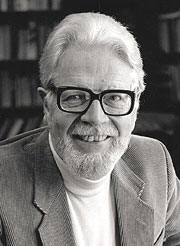Remembering Wayne C. Booth

Literary critic, esteemed professor, rhetorician, and scholar, Wayne C. Booth was born to Mormon parents in American Fork, Utah, on February 22, 1921. A young Booth served on a mission for the church before completing undergraduate work at Brigham Young University (1944) and graduate studies at the University of Chicago (1950).
Also ninety years ago this week, the word “robot” was ushered into the global idiom with the premiere of Karel Čapek’s R.U.R. (Rossum’s Universal Robots), a play that debuted on the stages of Prague (1921) before launching a four-month run at Broadway’s Garrick Theater in the winter of 1922-23.

After an early teaching stint at the University of Chicago, Booth taught at Haverford and Earlham Colleges before returning to the University as the George M. Pullman Professor of English in 1962, a position he would hold for nearly three decades (though continuing to teach on occasion even in his 80s). Just prior to his appointment, Booth published The Rhetoric of Fiction, a work which considers the literary text in light of both author and audience, applying Aristotelian theory and concepts to advanced discussions of how we make sense of the fictional form. For generations of scholars, the terms Booth advanced in order to analyze complex orders of showing and telling—the “implied author,” for example, or the “postulated reader”—became commonplace components of the critical lexicon.
Čapek didn’t credit himself with coining the word that became “robot”—instead, in an article printed in Lidové noviny (first articulated in response to the Oxford English Dictionary‘s etymology), he attributed the word’s origins to his brother Josef. Karel had initially wanted to use the Latin word for “labor,” rather than Josef’s suggestion of robota, which literally translates from the Czech as “serfdom” or “drudgery,” and connects to a traditional literature filled with Golem-like creatures.
Booth’s The Rhetoric of Fiction produced two editions, was translated into seven languages, and won awards from the Phi Beta Kappa Society and the National Council of Teachers of English, among other accolades. Booth continued to publish works of enormous influence on narrative theory and literary studies, including A Rhetoric of Irony, Modern Dogma and the Rhetoric of Assent, The Vocation of a Teacher, The Knowledge Most Worth Having, and several editions of The Craft of Research. Booth also championed teaching and collegiality, serving as Dean of the College from 1964 to 1969, helping to moderate unrest during the Vietnam War period. He coedited Critical Inquiry for many years; delivered one of the University’s Ryerson lectures; was awarded Guggenheim, NEH, and Ford Faculty Fellowships; served for one year as the president of the Modern Language Association; and was recognized by the American Association for Higher Education as one of six professors who made “a difference in higher education.” To this day, the University hands out the Wayne C. Booth Graduate Student Prize for Excellence in Undergraduate Teaching in his honor.

Čapek countered the adaptation of Robota in his play’s title, and in a gesture toward those titular entities (which were not mechanical, as in our modern sense of the word, but instead biological beings early mistaken for humans), included the name Rossum, which alludes to the Czech word rozum, meaning—naturally—”wisdom” or “intellect.”
Booth’s legacy as a top-tier scholar, both in terms of technical skill and ethical perspective, and teacher is nearly without peer. We remember him today, in light of other benign anniversaries, on what would have been his ninetieth birthday, as one who helped us wrestle with what it meant to be the opposite of Čapek’s robot—a bit more fully human.